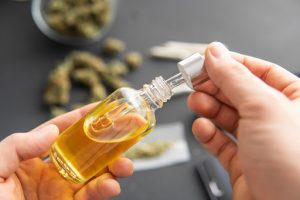Today, cannabis products are on the shelves at beauty salons, cafes, health centers, and seemingly everywhere in between. Now that cannabis has gone mainstream, cannabis extracts are nearly ubiquitous in our day-to-day lives, and the marijuana industry is booming. In fact, in Colorado, one of the first states where the industry gained a foothold, marijuana products recently totaled more than $1 billion in annual sales, and that number is only expected to increase in the years ahead. By 2025, the cannabis market as a whole is expected to exceed $66 billion. As legalization has spread across the country, the cannabis-derived products market has become not only bigger but more nuanced and sophisticated. This has led to the emergence of a vast spectrum of products designed to appeal to a range of consumers, including a premium cannabis sector seeking the best CBD oil on the market. In this post, we will discuss many of the most frequently asked questions about aromatic cannabis extracts, pure CBD extracts, cannabinoids, and more.
What Are the Health Benefits of CBD?
There are many purported CBD health benefits of note, although it’s important to remember that much research is still needed in this area. CBD is slowly gaining substantiated recognition as a medicinal compound, however. Last year, the FDA approved a drug containing CBD — the first FDA-approved drug ever to contain any marijuana-derived product. This particular drug, Epidiolex, is used to treat severe and rare types of epilepsy. CBD has also shown tremendous potential when it comes to treating inflammation and chronic pain. Studies have shown that when applied to the skin, CBD may provide arthritis pain and inflammation relief. One Harvard Medical School study suggests CBD may be able to provide relief for neuropathic pain. Ongoing clinical trials funded by the National Institutes of Health are currently assessing CBD health benefits related to PTSD and alcohol abuse, though it will be a few years before the results of these trials can be determined. With the latest farm bill, we can only expect research surrounding CBD health benefits to increase in the years ahead.
Are CBDs legal?
To make a long answer short, it’s complicated. The latest Farm Bill did provide a much overdue clarification differentiating the marijuana and hemp plants. The bill also legalized commercial hemp production. Unfortunately, because the FDA has approved pharmaceutical drugs containing CBD, the compound is now considered an active ingredient. Based on current policy, it is illegal to add active drug ingredients to foods, or to market such items as “dietary supplements,” according to the FDA. In June of this year, the New York City Department of Health doubled-down on its embargo on CBD-infused products around the city. In this latest instance, city officials reportedly ordered a local bakery to stop selling its popular CBD-infused goods, because restaurants in the city are not “permitted to add anything to food or drink that is not approved as safe to eat.” Only time will tell how this plays out, but following similar crackdowns in January of 2018, it looks as though this peculiar legal gray area may continue to negatively affect businesses in the cannabis market. For now, many cannabis entrepreneurs are hampered by growing uncertainties and mixed signals regarding CBD legal status at the federal level.
Learn more about the 2018 Farm Bill here.
What Are Cannabinoids?
Now, for a crash course in cannabinoids. “Cannabinoid” is the general term for a wide range of compounds found in the cannabis plant. While CBD and THC are the two most widely discussed and well-researched cannabinoids, researchers have so far identified at least 113 distinct chemical compounds, or cannabinoids, found in marijuana and hemp plants. THC and CBD both interact with the human endocannabinoid system, producing a detectible effect on the body, but their individual effects are vastly different. THC is the more famous of these two due to its psychoactive effects — the “high” marijuana users experience. However, the seemingly ever-expanding list of purported CBD health benefits is causing quite the buzz when it comes to research and marketing at the moment, especially because CBD is not psychoactive.
Can I Make CBD Oil at Home?
Short answer: yes. Here’s how to make CBD oil at home. First, you will need to extract the necessary compounds from the raw cannabis. This can be done using various extraction methods, but some methods are safer than others. High-quality CBD oil and other extracts you’d buy in a store usually have to undergo rigorous testing along the production pipeline to ensure purity before going to market. When making your own oil without industrial quality control measures, you’ll want to use a method that doesn’t use toxic solvents, to avoid the risk of ending up with these toxins left in your finished product. Supercritical CO2 extraction is a safe, efficient, and environmentally friendly process proven to yield consistently pure, aromatic extracts without the toxicity and other safety hazards inherent in solvent-based extraction methods.
In supercritical CO2 extraction, the plant material is first placed in an anodized aluminum vessel known as an extraction column. It’s best to load the extraction column by first filling small sections and then packing these sections together tightly. This allows the CO2 to come into direct contact with as much plant material surface area as possible. Then, in a separate compartment, an internal compressor and heating element are used to increase both the pressure and heat, allowing the CO2 to reach its supercritical state. In its supercritical state, CO2 maintains many properties of both a liquid and a gas. Supercritical CO2 dissolves material like a liquid, while also passing through plant material like a gas. Finally, depressurization causes the extract to separate from the CO2 and flow into a jar for collection and further treatment.
Learn more about supercritical extraction here
What’s the Best Extraction Method for CBD?
That, of course, is a difficult question to answer, as each process comes with its own advantages and disadvantages to consider. There are numerous CBD extraction methods to choose from, and an individual entrepreneur may prefer one process over another for economic or quality control reasons. Selecting the ideal essential oil or CBD extraction machine is an important decision for each manufacturer. The development and success of the rest of the operation will depend on the capabilities of the chosen extractor. Some of the best CBD oil on the market is produced using supercritical extraction, and for good reason. Supercritical extraction bypasses many of the potential health hazards associated with solvent-based methods. For example, chemical solvents (such as butane) may remain in the extracted products without proper treatment, and this is not an issue with supercritical extraction. Fortunately, with recent technological advancements, supercritical CO2 extraction also hits the sweet spot when it comes to return on investment, for producers of both high-quality CBD oils and other popular plant extracts. With the advent of the SuperC Extractor, the previous drawbacks of supercritical extraction, namely the once-high cost of setup, are no more. Modular tabletop CO2 extractors like the SuperC Extractor deliver premium cannabis products with quality and tunability in mind, for an affordable initial investment.
What Are the Health Benefits of Terpenes?
Terpenes are one of the latest crazes in the cannabis industry. Internet searches pertaining to terpenes have increased five-fold over the past two years alone. This sudden spike in interest is related to the aromatics and purported health benefits of terpenes. Recent research from Evergreen State College points to possible antidepressant and antianxiety properties of the terpene known as limonene. While the purported health benefits of terpenes have certainly spurred interest, controlled and curated terpene content is also indicative of high-quality CBD oil and other high-quality cannabis extracts. Simply put, various plants have developed different terpenes to help with everything from attracting pollinators to warding off plant-eating animals. These terpenes are also responsible for certain types of scents, such as the familiar “pine” scent emitted from pine trees. These terpenes add to their overall aromatic profile of a plant or plant product — an important aspect of the cannabis and cannabis-derived products market (including high-quality CBD oil).
Learn more about terpenes here.
Remember, not all CO2 terpene extraction machines or extraction methods will deliver the same high-quality CBD oils and other extracts. If you’re in the market for an affordable, efficient tabletop extraction machine engineered to give operators maximum control and acute precision with every extraction, look no further than OCO Labs Modular Tabletop Extractors. OCO Labs can provide affordable, unparalleled control over every run, to yield high-quality CBD oil and other cannabis extracts. Our Modular Tabletop Extractors are designed to be easy-to-use and safe for any operation. With our extraction products, you can cater confidently to all facets of the cannabis-derived product market.
We update our blog regularly so stay tuned for the latest on pure CBD oil, pure CBD extract, pure cannabidiol oil, and much more!






